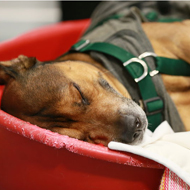
Innovative strategy helps to calm anxious rescue dogs
Stressed rescue dogs in London are enjoying a daily siesta after Battersea Dogs and Cats Home came up with a novel way to help its most worried residents.
Borrowing tips from the continent, the charity decided to introduce 'siesta time' - where the lights are turned off, soothing lullabies are turned on and staff and volunteers are under strict instructions not to disturb the dogs.
Apart from the odd snore, you can hear a pin drop at its London kennels between 12 and 1pm each day. Already the charity says it has noticed a change in its residents, with less barking, jumping up and other stress-related behaviours.
"Often dogs are at their most stressed when they first arrive at Battersea," explained Ali Taylor, head of canine behaviour training. "Kennels can be a very alien environment for a dog, especially if it's a pet that's come from a family home.
"We'll try anything we can to help minimise their anxiety during their stay with us - which is how 'siesta time' came about. If you're a dog owner you might notice how often your go will sleep during the day, but the dogs here struggle to relax when they're surrounded by so much noise in the kennels."
Observational research was carried out last year to test and measure the dogs' stress levels when they first arrived at the centre. Staff assessed the impact of siesta time by observing stress-related behaviours before and after, finding the midday kip was having a positive effect after just a few days.
"It's amazed what a small but practical idea can do for the welfare of our dogs," Ali added. "We’ve definitely noticed a change in our kennels, there’s less barking and the dogs are generally a lot calmer because of it. They know when ‘Siesta Time’ is coming and many of them are already in their beds before the lights are off!"
The charity says it even managed to rehome more dogs in January this year than it has done for two years. While this may not be as a direct result of siesta time, the scheme is helping dogs to relax, which ultimately makes them easier to rehome.
Siesta time will be trialled in Battersea's other two centres - Old Windsor and Brands Hatch - in the coming months.
Image © Battersea Dogs and Cats Home



 The Veterinary Medicines Directorate (VMD) is inviting applications from veterinary students to attend a one-week extramural studies (EMS) placement in July 2026.
The Veterinary Medicines Directorate (VMD) is inviting applications from veterinary students to attend a one-week extramural studies (EMS) placement in July 2026.